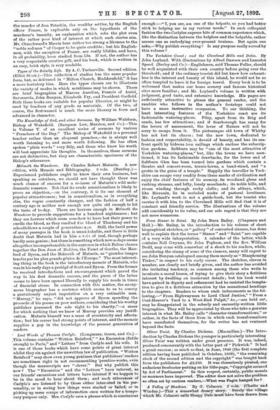Melmoth the Wanderer. By Charles Robert Maturin. I new edition,
with Memoir and Bibliography. 3 vols. (Bentley.)— Experienced publishers ought to know their own business, but speaking as outsiders, we should not have thought there was much chance of success for a re-issue of Maturin's wild melo- dramatic romance. Not that its crude sensationalism is likely to prove an objection,—on the contrary, it is its one element of popular attractiveness ; but in seusationalism, as in everything else, the vogue constantly . changes, and the fashion of half a century ago is neither new enough nor quite old enough to hit the taste of to-day. There are horrors enough in Melmoth the Wanderer to provide suggestions for a hundred nightmares ; but they are horrors which seem somehow to have lost their power to curdle the blood, as they curdled tie blood of Thackeray and his schoolfellows a couple of generations ago. Still, the lurid power of many passages in the book is unmistakable, and there is little doubt that Maturin had in him a vein of real, though perhaps hardly sane genius ; but there is something which now-a-days seems altogether incomprehensible in the sentence in which Balzac classes together the Don Juan of Mellen, the Faust of Goethe, the Man- fred of Byron, and the Melmoth of Maturin, as " grandee images trades par lee plus grands genies de rEurope." The most interest- ing thing in the book is the introductory memoir of Maturin, svho was in his early days a protege of Scott and Byron. From the former he received introductions and encouragement which paved the way to his first dramatic success, and the purse of the latter ' seems to have been opened liberally to supply his needs in times of financial stress. In connection with this matter, the anony- mous biographer has a sentence which seems to us to convey a gratuitously unjust imputation on a very estimable man. -" Murray," he says, "did not approve of Byron spending the proceeds of his poems on poor authors, considering that his worthy publisher possessed the sole right to his charity,"—a sneer for which nothing that we know of Murray provides any justifi- cation. Maturin himself was a mass of eccentricity and affecta- tion; but his career had strong points of interest, and the memoir supplies a gap in the knowledge of the present generation of readers.


































 Previous page
Previous page